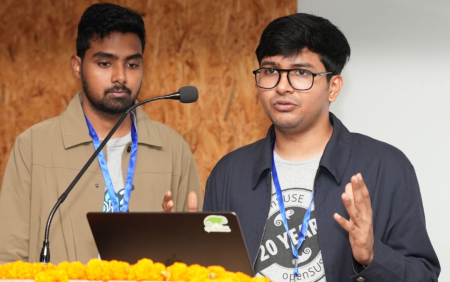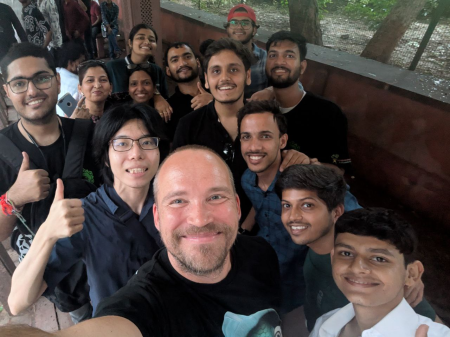openSUSE Asia Summit A Journey of Wonder
3. Sep 2025 | Douglas DeMaio | CC-BY-SA-3.0

The openSUSE.Asia Summit brought together developers, students and open-source advocates together at Manav Rachna International Institute of Research and Studies (MRIIRS) from Aug. 29 - 30 and celebrated 20 years of the project.
The two-day event opened with a ceremony and keynotes from Satyakam Goswami and I. Goswami covered the history of open-source and pulled off his shirt to reveal an openSUSE-themed T-shirt, underscoring his enthusiasm for the project. My keynote reflected the past two decades of the project and highlighted the milestones in the community’s growth.
Cake:

Talks ranged from healthcare to cloud computing. Axel Braun addressed the risks of commercial health data platforms and showcased GNU Health while Prakhar Bansal shared his experience deploying GNU Health at AIIMS during the COVID-19 pandemic, emphasizing the need for collaboration and code-sharing in India’s public sector.
Other sessions included virtualization strategies for enterprises, openSUSE’s role in data science with Python and Jupyter, and a shorter workshop on SELinux as well as a presentation on its advances and being the default security layer in openSUSE Tumbleweed. The project also had a few Google Summer of Code mentees provide talks at the event.
Google Summer of Code:

Google Summer of Code:

Lubos Kocman previewed the upcoming Leap 16.0 release and Patrick Fitzgerald argued the reasons for Linux adoption in governments and businesses as the end of Windows 10 opens the door for openSUSE. The summit was organized with the support of MRIIRS faculty and students, who worked alongside many speakers. More than 600 people attended the event.
Between talks, students and speakers bonded over tea breaks sharing interests, exchanging technical knowledge and personal stories.
The cultural exchange extended beyond the campus; on Sunday after the summit, a group of speakers, student helpers and organizers traveled to visit the Taj Mahal, capping the event by seeing one of India’s most iconic landmarks and one of the New 7 Wonders of the World.
Trip to Taj Mahal:

For many participants, the trip highlighted how open-source events can transcend technical learning and build networks for learning.
The book containing images of all the openSUSE Asia Summits was handed over to organizers of this year’s summit in India from last year’s organizers in Japan.
Summit Book:

Categories: Announcements openSUSE Summit
Tags: openSUSE Contribution Community Developers Project Asia Summit Faridabad India